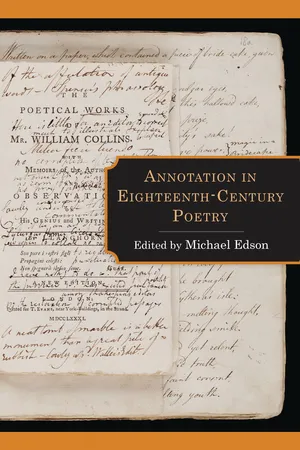
- English
- ePUB (mobile friendly)
- Available on iOS & Android
eBook - ePub
Annotation in Eighteenth-Century Poetry
About this book
Recent years have witnessed a growing fascination with the printed annotations accompanying eighteenth-century texts. Previous studies of annotation have revealed the margins as dynamic textual spaces both shaping and shaped by diverse aesthetic, historical, and political sensibilities. Yet previous studies have also been restricted to notes by or for canonical figures; they have neglected annotation's relation to developments in reading audiences and the book trade; and they have overlooked the interaction, even tension, between prose notes and poetry, a tension reflecting eighteenth-century views of poetry as aesthetically superior to prose. Annotation in Eighteenth-Century Poetry addresses these oversights through a substantial introduction and eleven essays analyzing the printed endnotes and footnotes accompanying poems written or annotated between 1700 and 1830. Drawing on methods and critical developments in book history and print culture studies, this collection explores the functions that annotation performed on and through the printed page. By analyzing the annotation specific to poetry, these essays clarify the functions of notes among the other paratexts, including illustrations, by which scholars have mapped poetry's relation to the expanding book trade and the class-specific production of different formats. Because the reading and writing of poetry boasted social and pedagogical functions that predate the rise of the note as a print technology, studying the relation of notes to poetry also reveals how the evolving layout of the eighteenth-century book wrought significant changes not only on reading practices and reception, but on the techniques that booksellers used to make new poems, steady-sellers, and antiquarian discoveries legible to new readers. Above all, analyzing notes in poetry volumes contributes to larger inquiries into canon formation and the rise of literary studies as a discipline in the eighteenth century.
Frequently asked questions
Yes, you can cancel anytime from the Subscription tab in your account settings on the Perlego website. Your subscription will stay active until the end of your current billing period. Learn how to cancel your subscription.
No, books cannot be downloaded as external files, such as PDFs, for use outside of Perlego. However, you can download books within the Perlego app for offline reading on mobile or tablet. Learn more here.
Perlego offers two plans: Essential and Complete
- Essential is ideal for learners and professionals who enjoy exploring a wide range of subjects. Access the Essential Library with 800,000+ trusted titles and best-sellers across business, personal growth, and the humanities. Includes unlimited reading time and Standard Read Aloud voice.
- Complete: Perfect for advanced learners and researchers needing full, unrestricted access. Unlock 1.4M+ books across hundreds of subjects, including academic and specialized titles. The Complete Plan also includes advanced features like Premium Read Aloud and Research Assistant.
We are an online textbook subscription service, where you can get access to an entire online library for less than the price of a single book per month. With over 1 million books across 1000+ topics, we’ve got you covered! Learn more here.
Look out for the read-aloud symbol on your next book to see if you can listen to it. The read-aloud tool reads text aloud for you, highlighting the text as it is being read. You can pause it, speed it up and slow it down. Learn more here.
Yes! You can use the Perlego app on both iOS or Android devices to read anytime, anywhere — even offline. Perfect for commutes or when you’re on the go.
Please note we cannot support devices running on iOS 13 and Android 7 or earlier. Learn more about using the app.
Please note we cannot support devices running on iOS 13 and Android 7 or earlier. Learn more about using the app.
Yes, you can access Annotation in Eighteenth-Century Poetry by Michael Edson in PDF and/or ePUB format, as well as other popular books in Literature & Literary Criticism History & Theory. We have over one million books available in our catalogue for you to explore.
Information
Table of contents
- Contents
- Acknowledgments
- Introduction
- Part I: Georgic Annotation
- Chapter 1: Annotating Georgic Poetry
- Chapter 2: William Falconer’s The Shipwreck and the Birth of the Dictionary of the Marine
- Part II: Nationalism, Antiquarianism, and Annotation
- Chapter 3: The Afterlife of Annotation
- Chapter 4: Topographical Annotation in Thomas Percy’s The Hermit of Warkworth and John Pinkerton’s The Bruce
- Chapter 5: Marginal Imprints
- Part III: Varieties of Annotation
- Chapter 6: A Translator’s Annotation
- Chapter 7: Allusion and Quotation in Chaucerian Annotation, 1687–1798
- Chapter 8: Looking Homeward
- Part IV: Annotating the Canon
- Chapter 9: Zachary Grey’s Annotations on Samuel Butler’s Hudibras
- Chapter 10: William Hymers and the Editing of William Collins’s Poems, 1765–1797
- Chapter 11: Paratexting Beauty into Duty
- About the Contributors